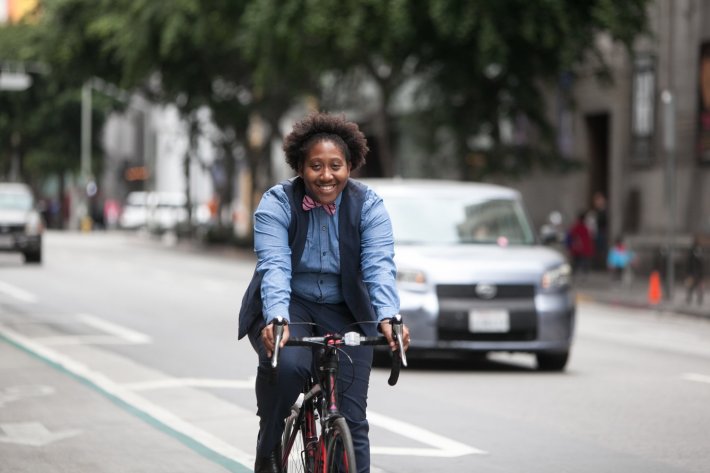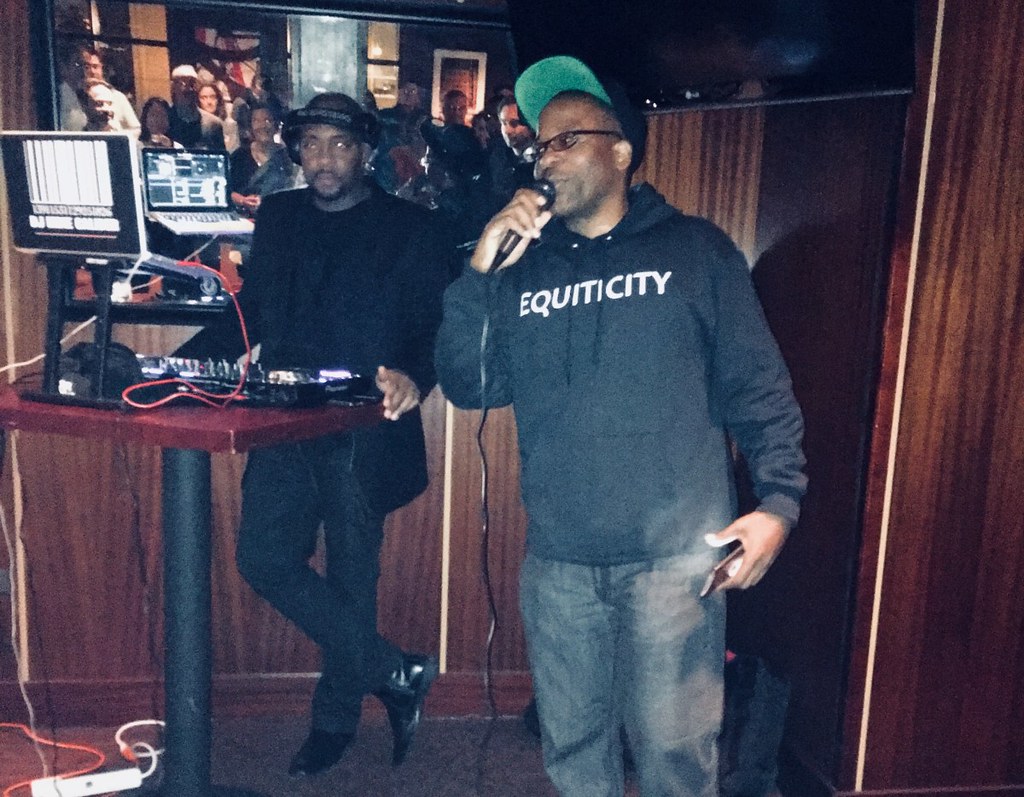[This piece previously ran in the Chicago Reader.]
For virtually all of the Active Transportation Alliance's 34-year history, the bosses have been white guys.
Local bike enthusiasts founded Active Trans in 1985 as the Chicagoland Bicycle Federation, with a mission of improving conditions for cycling. In 1987 Randy Neufeld, who's white, became the group's first executive director, and stayed in the job for 17 years. The other two permanent executive directors, Rob Sadowsky, who was hired in 2004, and Ron Burke, who took over in 2010, were also white men. (In 2008, the organization changed its name to the current one and officially expanded its mission to include walking and transit advocacy.)
In recent years, mobility-justice advocates of color have pushed the organization to do a better job representing the interests of low-income Black and Latinx neighborhoods on the south and west sides. They've called for more inclusion of the viewpoints of local residents, and more consideration of barriers to mobility and safety in these communities, including issues like housing displacement and police misconduct. They've also asked for a more equitable distribution of transportation infrastructure and resources to these areas.
Since Burke stepped down in August to take a job with Lyft, there has been talk about replacing him with a person of color. Some local transportation advocates, myself included, have specifically called for hiring a Black or Latinx director, ideally a woman. (Active Trans's executive search consulting firm contacted me for input, and I provided some potential candidates.)
Like many Chicago nonprofits, Active Transportation's staff is mostly white, and by its own admission, the organization has made some mistakes when it comes to addressing the needs of communities of color—more on that in a bit. Having a person of color in charge could be helpful for avoiding such tunnel vision in the future.
Interim director Melody Geraci, who's white, told me last week the group wants to hire an executive director from "a diverse talent pool that's representative of the region."
Oboi Reed, who's African American, cofounded Slow Roll Chicago, which promotes cycling on the south and west sides, and currently runs the mobility-justice nonprofit Equiticity. Like me, he wants Active Trans to hire a Black or Latinx executive director, a woman if possible. He added that he's encouraged that the organization is interested in better representation.
Reed said that he was "delighted" when Active Transportation's staff underwent anti-racism and implicit bias training after a painful incident highlighted the organization's blind spots. In August 2017, to celebrate the city of Chicago's Vision Zero initiative to eliminate serious and fatal crashes, which was launching in African American communities on the west side, the group announced it was hosting a Vision Zero summit.
This was in the wake of the 2014 Laquan McDonald police murder, and about a year after an officer fatally shot Black motorist Philando Castile during a traffic stop in Minnesota. Reed was worried about the potential for increased traffic enforcement through Vision Zero leading to more police harassment and violence against Chicagoans of color.
He argued that holding the summit downtown during business hours, with a $50 admission charge, guaranteed that few west-siders would attend, and noted that all of the announced speakers were white. Since, he said, Black residents would be largely excluded from a conversation that could impact their safety, he called on Active Trans to cancel the event, and the group did so.
Reed said the staff's participation in the racial sensitivity seminar reassures him that they would support leadership of color, but he's less confident about the board, which is responsible for choosing the new director and hasn't undergone such training.
Specifically, he said he's worried about having a repeat of what recently happened at the LA County Bike Coalition. Executive director Tamika Butler, who is African American and identifies as gender-nonconforming/trans, resigned in 2017 after years of attacks from mainstream cycling advocates who claimed her inclusion of the voices, access issues, and safety needs of marginalized communities in planning and policy discussions was a distraction from implementing livable streets initiatives.

Los Angeles city council candidate and bike shop owner Josef Bray-Ali, who's of Indian descent, branded her a "concern troll" after she discussed how Vision Zero traffic enforcement might make Angelenos of color less safe. Despite Bray-Ali's alleged harassment of Butler over the issue, both online and at public meetings, many white male bike advocates continued to endorse him until, and even after, it was revealed that he had made anti-Black and transphobic comments in other online forums. Some of the white male supporters cited Bray-Ali’s support for infrastructure and programs that would support their own physical safety while walking and biking.
"We have to get past a narrative that centers cisgender white maleness," Butler later wrote in a blog post. "I carried this opinion into every room, every speech, and every action I took as [executive director]. This made me unpopular with some members of the bike coalition, some board members, and some people outside of L.A. who constantly critiqued that I was not talking enough about bikes."
Reed noted that he and other Black bike advocates in Chicago gave a presentation before the Mayor's Bicycle Advisory Council in December 2014 requesting a more equitable distribution of cycling resources, such as bike lanes, Divvy stations, and bike education programs for African American communities. During the meeting then-Active Trans director Ron Burke asked whether the Black advocates had data to back up their claim of inequities. "That question . . . felt like a public challenge to us and implicitly came off as if Ron doubted us," Reed said.
At the next council meeting in spring 2015, the Black advocates presented data and maps that proved their point. Another Active Trans staffer was present, but Reed said he never heard back from the group about endorsing the call for racial equity.
Reed told me that since then, "equity has become a buzzword," and there seems to be more support at Active Trans for racial justice. In August 2017 the group endorsed a proposal for new fees on development along the gentrifying Bloomingdale Trail corridor to fund affordable housing. And this spring the group successfully lobbied for $50 million in annual state funding for walking and biking projects, including reforms to make it easier for low-income communities to apply for and receive funding.
But Reed said he still wants Active Trans's board of directors to undergo the same anti-racism training as the staff. "Should Active Trans hire a Black or Brown executive director, and should everyone from the staff and board be fully committed to racial equity and mobility justice, they will enjoy the full support of myself and Equiticity."
Shawn Conley, a member of the Major Taylor Cycling Club of Chicago, was one of the Black advocates who presented with Reed, and he shares his interpretation of what happened. "There seemed to be some pushback from Active Trans regarding our request. They advised us that they were going to keep doing things the way they'd been doing things, with bike infrastructure concentrated in neighborhoods with higher levels of cycling, where people are demanding it."
Charlie Short, who's white, was working with Active Trans as a consultant to the Chicago Department of Transportation at the time, managing bike and pedestrian safety programs, and was present at the bike council meetings. He also recalls recalcitrance from Active Trans on racial justice issues then. "In the meeting where Oboi and the other Black activists spoke, Ron Burke was superdefensive," he said. "I felt that Ron was only interested in a certain vision of what active transportation advocacy looked like, and anything outside of that could be dismissed. . . . When it came to equity, Ron was insistent that the organization was doing enough."
Another white former Active Trans employee, who requested anonymity for professional reasons, told me that staff members pushed for equity initiatives and the anti-racism training, but it often seemed like these things weren't a priority for Burke. "We struggled as an organization to hire and retain staff of color," they said. "Our good intentions often missed the mark or worse, tokenized our staffers. I always got the impression that equity was something the . . . executive leadership had no experience with and was only willing to 'check a box' on meaningfully integrating into our work and staff development."
Ron Burke declined to comment for this story.
Peter Taylor, an Active Transportation board member who's Black, also presented with Reed at the 2014 meeting, and told me he feels there has been positive change at the advocacy group recently. "Oboi has publicly raised issues that few others have, and there has been a noticeable effect on Chicago's discourse about mobility and equity."
Taylor added that, as a board member, he can't speak freely about the executive search. "But equity is at the top of my list of concerns, and I am not alone."
Board president Bob Hoel, who's white and is chairing the search committee, confirmed that. "Our mission clearly states that equity must be at the center of our work."
Geraci declined to directly discuss Active Trans's response to the Black advocates' call for equity, or the aborted Vision Zero summit, but said, "Previous harms related to social and racial justice need to be faced, and the board and staff has committed to making that journey. This very morning the board expressed to me their eagerness to go down that path, including racial sensitivity training."
"We know we've made some mistakes," Geraci added. "But it's extremely important to us to be an authentic racial justice- and mobility-justice-facing organization, and that means working from the inside out."




